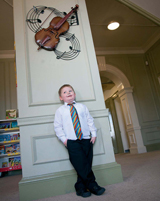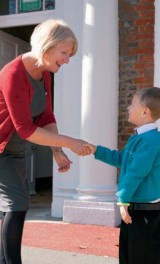Jerome Monahan visited the newly opened Langley Hall Primary Academy to see how it has set about making its mark...
You can tell a free school by the smell of fresh paint and wood, the unstained carpets and un-scuffed walls. There are clues too, at Langley Hall Primary Academy near Slough, in the stock cupboards which are groaning with unopened boxes. In one room, still-to-be-deployed hand puppets in the shape of a large elephant and a lion survey the stationery hoard from a high shelf. Despite the pristine environment, later in my visit nine-year-old Joe volunteers a surprising compliment in praise of his new school: “It feels like I have been here for ages but in a good way.”
His comment must be music to the ears of headteacher Jane Sculpher and education director Sally Eaton, for whom such a sense of belonging among pupils is a major achievement given the school is just over three weeks into its first ever term. “Ours was among the first batch of applications to set up a free school to be approved but the timetable was already tight before a two-week delay in the building handover,” says Mrs Eaton. “And we had already set ourselves quite a task hitting the ground on day one with classes for every year group including two reception groups and a combined year 5/6.”
 At the Ark Conway Primary Academy in White City, West London, headteacher Damien McBeath has faced a less onerous task beginning this academic year with a single reception class. “We were over-subscribed and have 20 on the waiting list,” he explains, “but it will take us a few years to reach our full capacity of 210 children and we are all rattling about a bit in our building.” Such a gradual expansion means that Conway is, at least currently, not ringdepleting other Hammersmith and Fulham schools’ existing cohorts – nor is it likely to in an area where local children have long struggled to gain places at nearby schools. And it was just this shortage that led local parents to set out on the free school route that has culminated in Conway Primary’s inception.
At the Ark Conway Primary Academy in White City, West London, headteacher Damien McBeath has faced a less onerous task beginning this academic year with a single reception class. “We were over-subscribed and have 20 on the waiting list,” he explains, “but it will take us a few years to reach our full capacity of 210 children and we are all rattling about a bit in our building.” Such a gradual expansion means that Conway is, at least currently, not ringdepleting other Hammersmith and Fulham schools’ existing cohorts – nor is it likely to in an area where local children have long struggled to gain places at nearby schools. And it was just this shortage that led local parents to set out on the free school route that has culminated in Conway Primary’s inception.
At Langley Hall Primary, Sally Eaton is also quite confident that the venture is unlikely to have a detrimental effect on other schools’ recruitment. “At the start of the free school process we were expected to conduct a careful assessment of local need, including consultation with other local heads.’ She suggests that due to Local Authority miscalculations, there has been a prolonged underestimate of school-place demand in Langley. “There is a 342 place shortfall locally and so our presence has meant that has dropped this September by 182 children, which can only be a good thing.” Far from local state schools feeling the pressure, a brief encounter with parent Alice Bunce suggests that it is the area’s independent schools that may be the principal local losers. “Langley Hall is really a bit of a God-send,” she admits. “There were no state places nearby for my seven-yearold, and we have been struggling with the fees for her current school. Now we have a five-minute walk each day and Hannah is loving the change.”
 “Setting up a free school is definitely not for the faint-hearted,” says business director Andrew Snowdon of the (Montessori) Discovery New School in Crawley, West Sussex. “It is really a misnomer to call them ‘free’ at all given the numbers of regulations you have to comply with – 37 sets at the last count. Of course, many of these are essential such as those that govern admissions, but some of the building regulations can be baffling. I have not had a day off in 16 months.” At the Conway Primary Academy in White City, Damien McBeath has been saved some of these headaches thanks to his being able to rely on the expertise available through the school’s affiliation to the Ark Academies network. It is an association that even funded Mr McBeath’s travelling to New Orleans to visit some of the city’s Charter schools - one of the inspirations for the original policy. “While they have done wonders in terms of restoring structure and confidence in post- Katrina devastated communities,” Mr McBeath comments, “the kind of rigid ‘off-the-shelf’ curriculum that teachers are expected to stick to was alarming.”
“Setting up a free school is definitely not for the faint-hearted,” says business director Andrew Snowdon of the (Montessori) Discovery New School in Crawley, West Sussex. “It is really a misnomer to call them ‘free’ at all given the numbers of regulations you have to comply with – 37 sets at the last count. Of course, many of these are essential such as those that govern admissions, but some of the building regulations can be baffling. I have not had a day off in 16 months.” At the Conway Primary Academy in White City, Damien McBeath has been saved some of these headaches thanks to his being able to rely on the expertise available through the school’s affiliation to the Ark Academies network. It is an association that even funded Mr McBeath’s travelling to New Orleans to visit some of the city’s Charter schools - one of the inspirations for the original policy. “While they have done wonders in terms of restoring structure and confidence in post- Katrina devastated communities,” Mr McBeath comments, “the kind of rigid ‘off-the-shelf’ curriculum that teachers are expected to stick to was alarming.”
Talking to Andrew Snowdon and other free school ‘pioneers’, it becomes quickly apparent that behind their perseverance is both a passion to provide something different for children but also hard-headed commercial experience. “We all feel incredibly privileged to be given the chance to set up a school in this way, but having a solid business trackrecord is also crucial. My having managed kitchens before, for example, has made it an easier to decide to prepare food on the premises but there are also solid educational reasons for doing so since children can be involved in the food preparation process.”
Such curriculum independence is something that is soon to crop up in discussions with those in the vanguard of the ‘free schools’ movement. Though, whether what is being proposed is all that at variance with well-run, creative maintained primaries is definitely open to debate. That said, the shape of the day at Langley Hall is intriguing, with mornings ring-fenced for mathematics and literacy and with a significant number of afternoons dedicated to such practical activities as whole-school violin lessons and swimming. “The way that many schools get around their obligation to provide swimming lessons is to devote time typically in Y4,” explains Sally Eaton. “We are determined that every child in the school will have a chance to swim each week, and it is among our plans to build a pool here in the school.”
 Building the children’s broader independence and resilience is also central to the school’s philosophy. “We are convinced that children need to take responsibility for themselves as early as possible,” adds Mrs Eaton. “So the youngest getting themselves sorted out for swimming – remembering their stuff and managing their dressing is a part of this - while the older children run a fruit stall each day. We ask that children come with their 20ps so they have to make a choice from a range of fruit on sale.”
Building the children’s broader independence and resilience is also central to the school’s philosophy. “We are convinced that children need to take responsibility for themselves as early as possible,” adds Mrs Eaton. “So the youngest getting themselves sorted out for swimming – remembering their stuff and managing their dressing is a part of this - while the older children run a fruit stall each day. We ask that children come with their 20ps so they have to make a choice from a range of fruit on sale.”
In the same spirit, children of all ages at Langley Hall are all off to the woods next summer - Carrotty Wood in Kent to be precise – where they will spend between one and four nights away from home. “We have also insisted that children audition for parts in this term’s school play,” adds Mrs Eaton. “For some this is the first time they have ever had a school play to audition for.” In keeping with all ‘free schools’, Langley Hall is obliged to sign up to local authority admissions policies, “but,” says head of school Jane Sculpher “the great thing is that parents have made a distinct choice to come to us and in doing so they have signed up to the love of learning and valuing of independence that are intrinsic to our values.”
Despite fears that ‘free schools’ have flourished only in areas of middle-class prosperity, all three of these primaries appear to serve very mixed communities. Thus the Ark Conway Primary Academy in White City has many of its children coming from the local Wormholt Estate as well as leafier parts of suburban Acton. Meanwhile at Langley Hall, while the number of number of children eligible so far for free school meals in just seven percent – well below national averages, the school boasts a rich cultural mix. “Just under half our children (49%) are of Asian origin,” says Mrs Eaton, “while three per cent are of Afro- Caribbean background and 37% of White British origin.”
Ask Jane Sculpher what the main satisfactions has been in setting up such a school from nothing and among them, she suggests, is the chance to create a staff from scratch. “It is rare to be able to fit people together into what should make an effective team from day one,” she says. “As well as experienced teachers we have a number of teachers starting out in the profession. It was clear when recruiting that those we wanted were eager to embrace the challenges and innovation possible at such a school. Those that we suspected were hoping for an easy ride with nice children did not get far.” Sally Eaton meanwhile is unfazed by the fact she has people without formal teaching qualifications leading some of the school’s activities. “In the end, given the opportunity to give children access to a person with expertise as a sports or voice coach, then I have no problem if they are effective but do not have formal teaching training. That said all our classroom teachers are qualified.”
 The same joy in fresh beginnings has also informed the curriculum at Langley. “We were in the privileged position of being able to create a timetable entirely free of existing encumbrances,” adds Mrs Sculpher. “So it has been possible to timetable our maths and literacy at the same time for the whole school and this in turn enables us to apply a system in maths which sees children working in mixed age groups according to ability. It is proving very popular and motivating.”
The same joy in fresh beginnings has also informed the curriculum at Langley. “We were in the privileged position of being able to create a timetable entirely free of existing encumbrances,” adds Mrs Sculpher. “So it has been possible to timetable our maths and literacy at the same time for the whole school and this in turn enables us to apply a system in maths which sees children working in mixed age groups according to ability. It is proving very popular and motivating.”
But despite being appearing remarkably bedded-down, three weeks into term and Langley Hall was only just getting telephones connected. “We also managed to forget loo-roll holders,” says Mrs Eaton. “There’s always something that’s bound to get overlooked setting up a school from scratch in the telescoped time-scale we have had to work within.”
Views from both sides of the fence…
Patrick Roach, Deputy General Secretary of the NASUWT:
“Free schools are a costly and unnecessary experiment in children’s education that provides no guarantees to parents or to children and young people. There is no guarantee that free schools will raise standards of education.”
Lord Hill of Oareford CBE in a letter to The Times:
“The fact that hundreds of families are putting their faith in these brand new schools – schools that do not yet have exam results or Ofsted ratings to prove their worth – is remarkable. It clearly shows that parents want a better choice of local schools – run by teachers, not bureaucrats – which offer strong discipline, excellent teaching and high standards.”
Michael Gove in his speech to The Policy Exchange on free schools:
“In Sweden, the old bureaucratic monopoly that saw all state schools run by local government was ended. Over a fifth of Swedish schools are now non-selective, highly-autonomous, state free schools. Academic studies confirm that pupils at these schools get better results than pupils at traditional schools; that free schools improve standards across the local authority; and that parental satisfaction has significantly increased.”
Dr Jonas Vlachos of thinktank SNS speaking to the Observer about Swedish free schools:
“The empirical evidence showing that competition is good is not really credible, because they can’t distinguish between grade inflation and real gains.”
Top tips for differentiation
Ace-Maths
